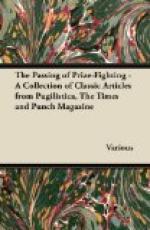I will call him “Snaggs”; that will save me the trouble of having to write “my right-hand man” every time I want to refer to him; but when he enters my service such economy of labour will not, of course, be necessary. Snaggs, then, will arrive punctually at nine every morning—no, on second thoughts he will sleep in, in case an inspiration that needs recording arrives after I have gone to bed. (I shrink from estimating how much wealth I have lost through going to sleep on my nocturnal inspirations, which the most thorough search next morning never avails to recapture; but a speaking-tube, with alarm attachment, running into Snaggs’s room will alter all that.)
His first duty of the day will be to wade through all the newspapers and cut out any paragraphs that may serve as pegs for an article or a set of verses. My own difficulty in this respect has always been that I can never manage to get through more than one paper in a working morning, and not all of that; invariably my attention gets caught by some long and instructive but (for my purposes) hopelessly unsuggestive dissertation on Pedigree Pigs or The Co-operative Movement in Lower Papua, and I consequently overlook many of those inspiring little “stories” that inform us, for example, that a distinguished physician advocates the use of tomato-sauce as a hair-restorer.
By the time I have finished breakfast, I reckon, Snaggs will have found me subjects for at least a dozen effusions, neatly arranged with a few skeleton suggestions for the treatment of each. I shall first decide which are to be handled in prose and which in verse, and in the case of the latter shall jot down a few words and phrases that will obviously have to be dragged in as line-endings. Then I shall put Snaggs on to the purely mechanical drudgery of finding all the possible rhymes to these words (e.g., fascinate, assassinate, pro-Krassinate—you know the sort of thing that’s called for), and by the time he has catalogued them all I shall have dashed off most of the prose articles, which Snaggs will then proceed to type while I am engaged in the comparatively simple task of piecing together the verse jigsaws. In this way I should easily be able to earn an ordinary week’s takings in a morning.
The next task will be the placing of this material, and that is how Snaggs’s afternoons will be spent. I have always had an unnecessarily tender feeling for editors, and often, after laboriously giving birth to an article, have concealed it in a drawer rather than run the risk of boring anyone with its perusal. Snaggs, however, will be fashioned of more pachydermatous material and will daily make himself such a nuisance that they’ll give him an order, and possibly a long contract, to get rid of him. By a proper system of book-keeping he will also save me from the occasional blunder of sending the same article to the same paper twice.




